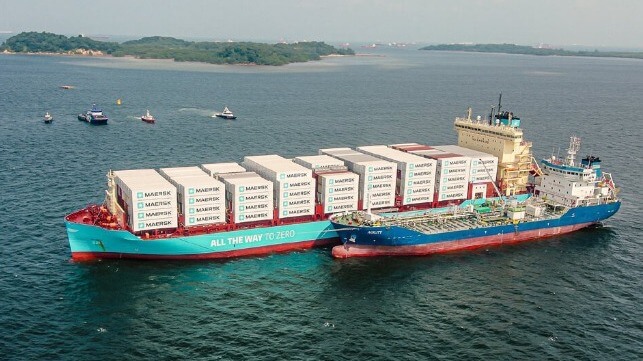Study: Existing Fire-Fighting Rules Need Overhaul for Methanol-Fueled Ships

While interest in methanol-fueled ships is growing rapidly as a means of addressing emissions, a new fire safety study reports that existing fire-fighting methods and regulations are not ready for methanol ships. According to Survitec which conducted extensive comparative fire tests on dual-fuel marine engines using diesel oil (DO) and methanol, existing fire-fighting methods used to extinguish machinery space spray and pool fires on conventionally fueled vessels are inadequate when dealing with methanol-based fires.
“Our tests confirm that traditional water mist fire suppression mechanisms do not perform as expected on methanol pool fires and methanol spray fires,” said Michal Sadzynski, Product Manager, Water Mist Systems, Survitec. “Methanol fires are far more aggressive than fires involving traditional hydrocarbon fuels. Methanol fires have different physicochemical properties and so they cannot be extinguished as easily or with the same approach.”
Methanol is a methyl alcohol (CH3OH) that burns in a completely different way than hydrocarbon fuels and has a much lower flashpoint of 12°C (54°F), according to Survitec. They report their testing found that while water mist systems are highly effective in absorbing heat and displacing oxygen on diesel fires, they do not produce the same results on methanol fires.
The concern for fire-fighting and the protocols Survitec says may be especially significant as the shipping industry begins to look at the conversion of existing vessels to methanol. Currently, there are only a relatively small number of methanol-fueled ships in service with a focus on newbuilds that were specifically designed for the alternative fuel. Now, however, the industry is beginning to explore retrofits. Maersk, for example, has scheduled the first-ever refit of a large containership for this summer in a demonstration project to take a decade-old vessel running on conventional fuels and convert it for dual-fuel methanol operations.
The results of their testing the company says demonstrate that if existing vessels are retrofitted to run on methanol, they would need to overhaul and redesign their fixed fire-fighting arrangement completely.
"Our tests demonstrate that standard discharge devices do not properly extinguish methanol pool fires in the confined bilge space,” said Sadzynski. He cites as an example of the challenges, “the range for nozzle installation height is much lower than that needed to put out a diesel fire. We have to completely rethink nozzle placement, spacing, and other factors to make water mist suppression effective on methanol.”
Survitec also highlights that while there are established fire safety regulations and testing standards for diesel fuels, clear test protocols for alcohol-based fuels such as methanol and ethanol have yet to be developed.

that matters most
Get the latest maritime news delivered to your inbox daily.
“We believe this is a high-risk situation that needs immediate action,” concluded Sadzynski.
The company is calling on stakeholders and regulators to come together to address methanol's unique fire risks and create clear standards, new testing protocols, and updated safety rules for methanol.
